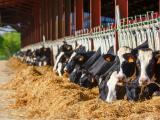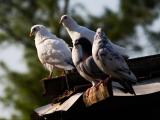Dec 30, 2003 (CIDRAP News) – The outbreak of avian influenza in South Korea has spread to at least 14 farms and triggered the culling of 1.2 million chickens and ducks since it was identified in mid-December, according to reports from Asian newspapers.
Cases of the disease had been confirmed at 14 farms as of Dec 28, and another 18 farms were under investigation, according to a report in the Korea Times of Dec 28. In a Dec 29 report, the Korea Herald said more than 1.2 million birds had been killed to contain the disease. At one farm the disease was suspected in quail, the Times reported.
The Korean Ministry of Agriculture was planning to destroy 2.5 million chickens and 150,000 ducks to stop the outbreak, according to a Dec 27 report in the Korea Herald. Officials said about $5.8 million would be budgeted to buy and destroy the birds and about 3.5 million eggs.
An H5N1 virus has been blamed for the outbreak. In 1997 an H5N1 virus crossed into humans in Hong Kong, causing 18 cases and six deaths. Two more human cases of H5N1 infection, with one death, were reported in Hong Kong last February. However, no human influenza cases have been reported so far in connection with the South Korean outbreak.
Officials said virus samples have been sent to the US Centers for Disease Control and Prevention for testing to determine whether it is the same variant that sickened people in Hong Kong.
News reports said the price of chicken had dropped about 40% as a result of the outbreak. One report, in Taiwan's Taipei Times, said "fear of chicken" was running high in South Korea because of concern that the virus could be the same variant that jumped to humans in Hong Kong.
Korean government officials were working to convince the public that chickens and ducks are safe to eat when properly cooked, according to reports. The prime minister and other officials were filmed eating chicken in restaurants, and the government distributed free boiled eggs and chicken along with leaflets, the Taipei Times reported.



















